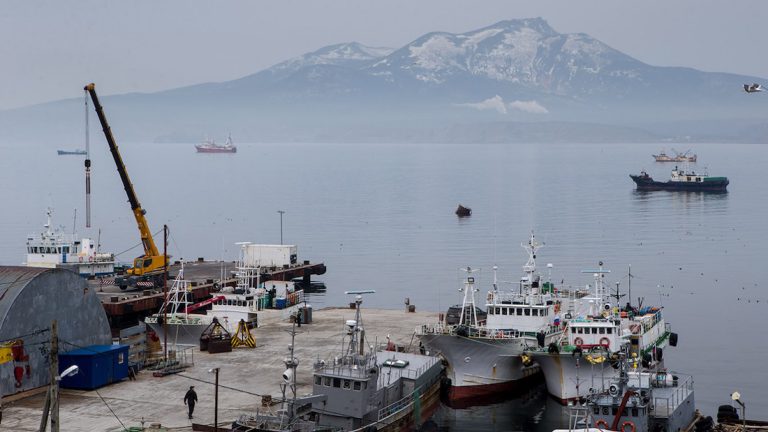
Tokyo – Japan has lodged a formal protest with Russia over restrictions on sea navigation around the Kuril Islands, a disputed territory known in Japan as the Northern Territories, according to reports from Russian state media and Japanese officials.
The restrictions, which bar foreign military and civilian ships from navigating waters near the southern Kuril Islands from April 16 to May 1, have heightened tensions in a decades-long territorial dispute.
The Japanese government, through its Foreign Ministry, sent a letter of protest to Moscow, accusing Russia of violating international maritime rights. Chief Cabinet Secretary Yoshimasa Hayashi, a senior official in Tokyo, emphasized that the restrictions infringe on Japan’s navigational freedoms, calling the move “unacceptable.”
Japan maintains that the four southern islands—Kunashiri, Etorofu, Shikotan,
and Habomai—are inherent Japanese territory, illegally occupied by
Russia since Soviet forces seized them at the end of World War II in 1945.
Russia, however, asserts full sovereignty over the Kuril Islands, referring to them as part of its Far East territory. Russian state-run news agency RIA Novosti reported that the navigation restrictions are a temporary measure, though Moscow provided no detailed justification for the timing or scope. The move follows a pattern of Russian actions in the region, including military drills and infrastructure development, which Japan has repeatedly protested.
The Kuril Islands dispute has prevented Japan and Russia from signing a formal peace treaty to end World War II hostilities. Japan’s 2025 Diplomatic Bluebook, released earlier this month, reiterated Tokyo’s commitment to resolving the territorial issue through negotiations, despite deteriorating bilateral relations. Russia’s withdrawal from peace treaty talks in 2022, in response to Japan’s sanctions over the Ukraine conflict, has further complicated diplomatic efforts.
The current restrictions come amid heightened Russian activity in the region.
Since 2015, Russia has militarized the Kuril Islands, deploying missile systems and constructing surveillance bases, moves analysts interpret as both strategic positioning and a response to Japan’s support for Ukraine.
In January 2024, former Russian President Dmitry Medvedev vowed to increase the islands’ strategic role, including deploying new weapons, dismissing Japan’s territorial claims with provocative rhetoric.
Japan’s protest also reflects broader geopolitical tensions.
Tokyo has aligned closely with Western nations, imposing sanctions on Russia and providing aid to Ukraine, prompting retaliatory measures from Moscow. In March 2025, Russia banned Japan’s Foreign Minister Takeshi Iwaya and eight other Japanese citizens from entering the country.
Earlier this month, Russia designated Japan’s Northern Territories Issue Association as an “undesirable organization,” accusing it of promoting revanchist ideas.
Maritime restrictions around the Kuril Islands are not unprecedented.
In July 2024, Russia suspended Japanese seaweed harvesting near the islands, citing maintenance work, a decision Japan also protested. Such actions underscore the ongoing challenge of managing economic and cultural ties in a contested region. The islands, stretching 1,250 kilometers between Japan’s Hokkaido and Russia’s Kamchatka Peninsula, are strategically located, separating the Sea of Okhotsk from the Pacific Ocean.
International reactions to the dispute remain limited.
While Ukraine’s President Volodymyr Zelenskyy recognized the Kuril Islands as Japanese territory in 2022, major powers like the United States and China have largely stayed neutral, wary of escalating regional tensions. Analysts suggest that Russia’s actions may aim to assert dominance in the Pacific amid its strained relations with the West.
Japan has vowed to continue diplomatic efforts to resolve the dispute, though prospects for a breakthrough appear dim. “The Northern Territories are inherent Japanese territory, and we will persist in negotiations,” a Foreign Ministry spokesperson stated. Meanwhile, Russia’s Foreign Ministry has yet to respond publicly to Japan’s latest protest, leaving the issue unresolved as both nations navigate a fragile diplomatic landscape.
The navigation restrictions, set to expire on May 1, could be extended, further straining Japan-Russia relations. For now, the Kuril Islands remain a flashpoint, emblematic of unresolved historical grievances and competing visions of sovereignty in the Pacific.
Japan Accuses Russia of Restricting Navigation Near Kuril Islands (April 17, 2025)